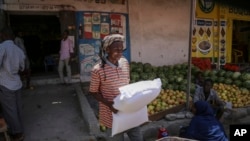In the last five years, “the number of people living in acute food insecurity … has skyrocketed from 108 million people to 161 million people around the world.” And that was before the Russian Government’s unprovoked invasion of Ukraine, which may drive another 40 million people worldwide into extreme poverty and food insecurity,” said Secretary of State Antony Blinken.
“Some have tried to blame the sanctions imposed on the Russian Federation by the United States and many other countries for worsening this crisis,” said Secretary Blinken.
“This is false. When we imposed sanctions on Russia in order to end the war as quickly as possible, we deliberately and carefully created exceptions for agricultural goods and fertilizer. We’re working every day to get countries any information or assistance they need to ensure that sanctions are not preventing food or fertilizer from leaving Ukraine, Russia, or anywhere else.”
Speaking at a late May Ministerial-level meeting on global food insecurity, Secretary Blinken suggested a four-step process for addressing the crisis.
“First, we need countries to step up with substantial new contributions to fill the gaps faced by humanitarian organizations and agencies that are battling food insecurity which are forcing humanitarian groups to make incredibly wrenching decisions about when and where to cut lifesaving assistance.”
Leading by example, the United States will add another $215 million in emergency food assistance to the $2.3 billion we have already provided since Russia’s invasion of Ukraine.
Second, we must address the global fertilizer shortage. “Consider Africa, where the cost of fertilizer has already quadrupled since the start of the pandemic and has skyrocketed further since the Russian invasion of Ukraine. One way to address this is by creating incentives for countries to produce more fertilizer as the United States is doing by committing $500 million to boost U.S. production.”
Third, we must increase investments in agricultural capacity and resilience. The United States will invest $5 billion over the next five years.
“Fourth, we believe that we have to help poor and vulnerable populations bear the colossal impact of this crisis.”
And finally, we must take the added risk of planting significantly more crops.
“If we take these steps together … we will meet this crisis, we’ll help prevent others like it, most important, we will save countless lives,” said Secretary Blinken. “That’s what’s at stake, but I’m convinced that if we come together, we can address this challenge.”
Blinken on Greatest Global Food Security Crisis of our Time

In the last five years, “the number of people living in acute food insecurity … has skyrocketed from 108 million people to 161 million people around the world.”





